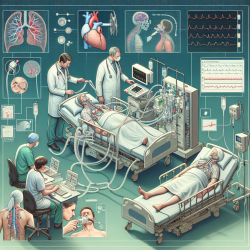The management of acute on chronic neuromuscular respiratory failure presents unique challenges for practitioners working in intensive care units (ICUs). This condition often affects patients with neuromuscular diseases such as amyotrophic lateral sclerosis (ALS), where progressive respiratory muscle weakness can lead to acute respiratory failure. A recent research article titled Acute on Chronic Neuromuscular Respiratory Failure in the Intensive Care Unit: Optimization of Triage, Ventilation Modes, and Extubation provides valuable insights into optimizing care for these patients.
Understanding the Challenges
Patients with neuromuscular diseases often rely on noninvasive ventilation (NIV) at home to manage chronic respiratory insufficiency. However, when these patients present with acute respiratory decompensation, the situation becomes complex. The research highlights that while NIV reduces hospitalization rates and prolongs survival, it is not infallible. Acute exacerbations may require adjustments to NIV strategies or even transition to invasive mechanical ventilation.
Optimizing Triage and Ventilation
The research emphasizes a protocolized approach to triage and management. Key steps include:
- Comprehensive Evaluation: Identifying new etiologies of hypoxia and hypercapnia beyond the progression of the neuromuscular disease itself is crucial. This may involve intubation or advanced adjustments of NIV machines.
- Ventilation Management: Once the acute cause is identified and treated, focus shifts to optimizing pulmonary function through mechanical airway clearance and facilitating successful extubation to NIV.
- NIV Adjustments: In cases where NIV is appropriate, settings should be adjusted to ensure optimal ventilation and oxygenation. Advanced modes like volume-assured pressure support (VAPS) may be advantageous.
The Role of Multidisciplinary Care
A multidisciplinary approach is essential in managing these patients effectively. Involving respiratory therapists, speech and language therapists, and physical therapists can significantly enhance care quality. High-quality standardized respiratory care is one of the few treatments that can prolong survival and preserve respiratory strength in patients with neuromuscular diseases.
Encouraging Further Research
The article serves as a foundation for practitioners to refine their approaches to managing acute on chronic neuromuscular respiratory failure. However, it also highlights the need for further research to validate these protocols across different institutions and patient populations. Practitioners are encouraged to develop their own approaches while contributing to future research efforts that can rigorously investigate these protocols versus others.
To read the original research paper, please follow this link: Acute on Chronic Neuromuscular Respiratory Failure in the Intensive Care Unit: Optimization of Triage, Ventilation Modes, and Extubation.










